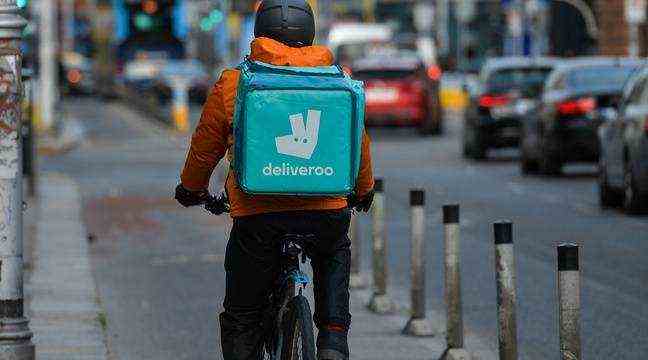Uber, Deliveroo or Bolt… An arsenal of measures to strengthen the rights of workers on digital platforms was unveiled this Thursday by Brussels, which set EU-wide criteria to determine whether or not they should be considered as employees.
Treated by default as independent, complicating their access to social coverage, the millions of deliverers and drivers working for these platforms could soon see their status clarified, according to the European Commission project, which has yet to be approved by States and MEPs. .
Five criteria
Concerned about harmonization, Brussels proposes five criteria: the fact that a platform fixes the levels of remuneration, supervises the services remotely, does not allow its employees to choose their schedules or refuse assignments, requires the wearing of uniform , or even banned from working for other companies. If at least two criteria are met, the platform would be “presumed” employer, and would have to comply with labor law obligations (minimum wage, working time, sickness benefits, safety standards, etc.) imposed by the legislation of the country concerned.
The text also proposes to impose increased transparency on the functioning of the algorithms of the applications, by informing the workers on the way in which they are supervised and evaluated (distribution of the missions, attribution of bonuses …) If the platforms of delivery of meals or vehicles with driver (VTC) are the first targets, online services (translation…) are also concerned: in all, some 500 companies and 28 million workers in the EU.
“Predictability”
“Platforms play a crucial role in the economy (…) The people at the heart of their economic model deserve decent working conditions, and our proposals bring predictability to the platforms”, argued the Vice-President of the Commission , Valdis Dombrovskis. The Commission also hopes that this project will make it possible to harmonize the decisions of the courts, faced with hundreds of disputes. If the judgments, from Spain to the Netherlands, have for the most part requalified as employees the workers of the pinned platforms, other decisions go in the opposite direction: a Belgian court dismissed several dozen Deliveroo couriers on Wednesday.
In France, Uber has been the subject of an investigation since 2015 for “hidden work” on its VTC drivers. “For too long, platforms have made enormous profits by evading their fundamental obligations at the expense of workers, while deceptively ensuring that they offered them a choice,” said Ludovic Voet, president of the ETUC (confederation of European unions). “These platforms claim to be intermediaries, while in practice they determine prices, hours, conditions of service”, observed in September the MEP Leïla Chaibi (GUE / NGL, left), initiator of a parliamentary resolution demanding that workers no longer have to prove their relationship of subordination in the event of a dispute.
“Disastrous consequences”
“The platform model was built by taking advantage of gaps and imprecision in legislation” and thanks to the self-employed “who allow them to save certain social contributions, without paying a minimum wage, and therefore bypassing social legislation. We want to correct ”this situation, explained the Commissioner for Employment Nicolas Schmit. The platforms could oppose the status of employer if they manage to demonstrate the self-employed status of their workers, under national law.
And workers wishing to remain independent “will be able to do so without going to court”, assures Nicolas Schmit. The Commission also proposes to improve the conditions of the self-employed, by giving them the right to collective bargaining. The EU has limited competence in labor law, and the platforms face a disparity of national rules. In Spain, meal delivery men are now recognized as employees – pushing Deliveroo out of this market. Elsewhere, courts have ordered platforms to enter into collective agreements even with self-employed workers.
The platforms fiercely oppose any major requalification of workers, fearing an increase in legal proceedings with “disastrous consequences for jobs, restaurants and the economy”, warns the Federation Delivery Platforms Europe. It highlights a study by Copenhagen Economics predicting that such a scenario would force 250,000 people in the EU to leave the sector. “The Commission’s proposals could jeopardize thousands of jobs, weighing down small businesses in the midst of a pandemic and threatening services to consumers”, criticizes a spokesperson for Uber, praising the “flexibility” offered to its drivers and his delivery men.

